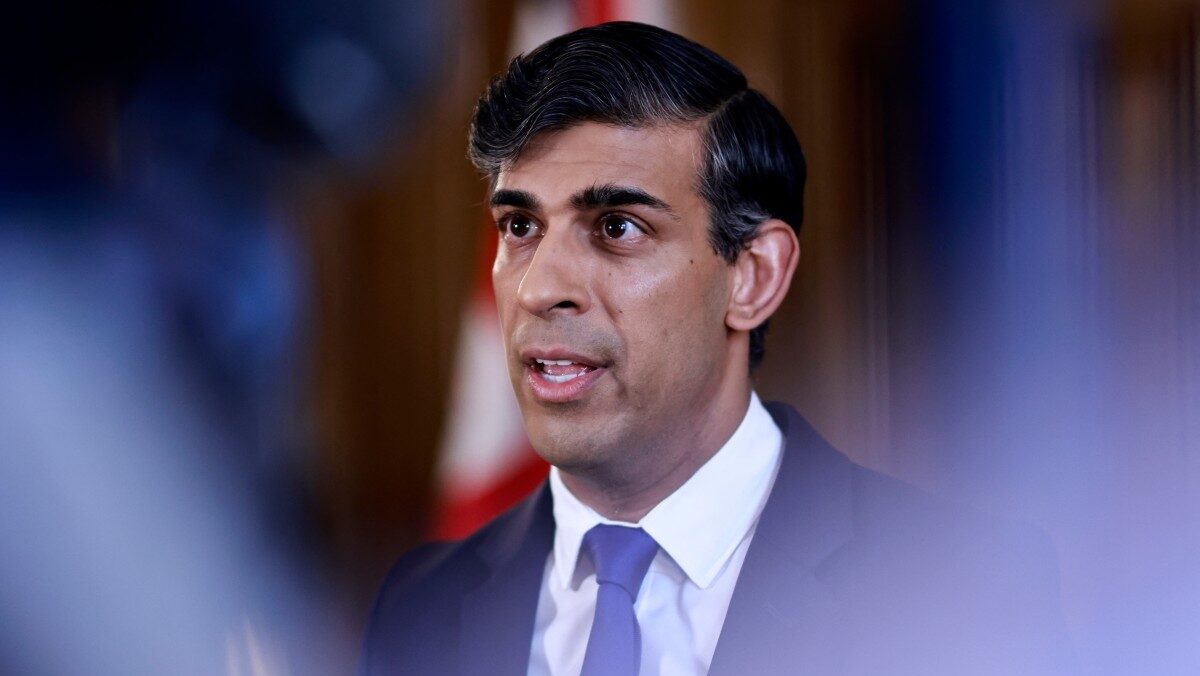
Photo: BENJAMIN CREMEL / POOL / AFP
Few pieces of legislation can have made it into the news bulletins so often without having made an ounce of progress as Rishi Sunak’s failing ‘Rwanda plan.’
The House of Lords, Parliament’s mainly appointed upper chamber, delivered a double defeat to Sunak on Wednesday night by sending two amendments to the bill back to the House of Commons, Parliament’s lower chamber.
Robert Bates, research director at the Centre for Migration Control think tank, told The European Conservative that the Lords were being “true to form and siding with international bodies, quangos, and left-wing activist groups rather than working to fulfil the wishes of the electorate.”
Unelected peers have decided to sequester themselves away from public opinion and proper democratic accountability.
Since the Rwanda plan was announced, Peers have been a key plank of the anti-border coalition. They have fought endlessly alongside immigration lawyers, the Supreme Court and taxpayer-funded charities to ensure that Britain remains a nation without border controls.
Two years have passed since the plan to deter Channel crossings by sending illegal migrants to Rwanda for asylum processing was announced by the then-Prime Minister Boris Johnson, who had long believed Britons ought to “stop moaning” about border control.
In all this time, zero migrants have been deported, despite hefty sums of cash having been spent both on getting Rwanda on side and on point-scoring photo ops. An airline willing to carry out the deportations has yet to be secured, with companies turning down offers due to concerns about reputational risk; the government is considering using the Royal Air Force instead. But even if a carrier had been found, a torrent of political squabbling means that the plan still isn’t in law.
The latest defeat by the Lords means the plan will have to go to a fourth round of Parliamentary scrutiny, and has forced officials to stop suggesting that deportation flights will take off before the end of spring.
It is worth noting, however, that the government could have forced further votes on the legislation last night, but chose not to, pushing its return to Parliament back to Monday at the earliest. One former Conservative cabinet minister told The Times that this was a “deliberate tactic” based on the fact “the government is clearly not ready to operationalise the policy despite two years of preparations by the Home Office.” They added that ministers have “concluded that the policy doesn’t work and they’ll only be able to get a small number of symbolic flights off the ground before the general election.”
So it suits them to go incredibly slowly, to draw out the process for as long as possible so it’s as close to the election as possible so voters don’t see how much of a failure it will be.
One current ‘senior’ minister also told Sky News that “delaying tactics” are in play “because [government officials] know the version of the policy doesn’t work and they want more time and to put off the day of reckoning.”
Outside of Parliament, the total failure of Sunak’s plan to deter illegal migration was made clear on Sunday, when more than 500 migrants crossed the Channel in one day, setting a new record for this year.
Robert Bates told this publication that while the Rwanda plan will likely become law “in the coming weeks … with over 500 illegal migrants breaking into Britain last weekend, the idea that this watered-down bill will solve the problem is for the birds.”
He added that “the prime minister and home secretary have buried their heads in the sand” and must now take “decisive action” on the matter, such as leaving the European Court of Human Rights.
